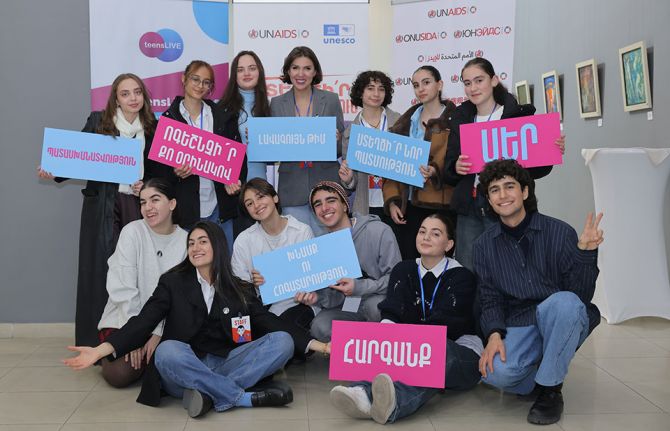

Feature Story
Promoting positive masculinity to end gender-based violence in Armenia
09 January 2025
09 January 2025 09 January 2025A new initiative in Armenia is redefining perceptions of gender roles to end gender-based violence in the country.
Gender-based violence remains a significant challenge in Armenia. Deeply rooted in societal norms and cultural attitudes, it disproportionately impacts women and girls, especially from marginalized and vulnerable groups, increasing their risk to HIV infection and reducing their ability to access HIV prevention and treatment services.
A recent study on perceptions of violence in Armenia, done with support from the European Union showed that, over the past year, more than 80% of women living with HIV or from other key populations reported experiencing violence from a spouse or partner. And a 2023 Gender Assessment report, supported by UNAIDS, stressed the prevalence of gender-based violence in Armenia and underscored the urgent need for actions to address harmful gender norms.
Addressing this issue requires a multifaceted societal effort, including legislation, policies, and cultural shifts. However, a critical component is redefining perceptions of gender roles and masculinity, starting at a young age. To that end, UNESCO and UNAIDS, with support from the Government of the Grand Duchy of Luxembourg launched The Joint Positive Masculinity Project. Addressed to young men aged 16–25, the initiative aimed to foster healthier attitudes toward masculinity, advancing gender equality and reducing violence.
The initiative used diverse and engaging digital content that resonate with young people, including articles, comics, and partnerships with influential local figures like sportsman Levon Hovhannisyan and actor Boris Melqonyan. These collaborations amplified the campaign’s message, sparking critical conversations about redefining masculinity.
A centerpiece of the initiative was a digital masculinity test, designed to challenge traditional views and encourage healthier attitudes. Nearly 2,000 young men participated, providing valuable insights. For example, harmful environments such as bullying, family violence, and misinformation were identified as key contributors to toxic masculinity, with 76.5% of respondents linking these factors to aggressive behavior and unhealthy gender norms.
Personal relationships with family and friends were shown to be the most influential in shaping positive masculinity, demonstrating the importance of interpersonal connections in fostering healthier attitudes.
Participants increasingly rejected harmful traits such as aggression and superiority over women, instead valuing emotional intelligence, care for others, and non-violence.
“The campaign sparked a crucial dialogue among Armenian boys and young men, empowering them to embrace a more inclusive and emotionally intelligent form of masculinity,” said Elena Kiryushina, UNAIDS Gender and Youth officer for the Eastern Europe and central Asia region. “The test results underscore the importance of addressing toxic behaviours in both media and social environments and demonstrate the potential for positive change.”
Through the project’s digital platform, young men openly discussed healthier masculinity, explored ways to manage stress, sought mental health support, and embraced non-violent behaviors. These efforts represent a significant shift toward creating healthier, more equitable gender dynamics.
The campaign achieved over 840,000 impressions across Instagram, Facebook, TikTok, and Telegram, far exceeding its initial targets and signaling a strong appetite for change among Armenian youth.
The campaign aligns with recent amendments to Armenia’s 2017 domestic violence law, which provide a more supportive environment for addressing harmful gender norms. By engaging adolescent boys and young men as agents of positive change, the project challenges entrenched stereotypes and promotes respectful, equitable relationships.
Ekaterina Samolygo, UNESCO IITE Project Coordinator, emphasized, “Gender equality is a fundamental human rights issue and a precondition for sustainable, people-centered development. This initiative is a significant step toward transforming unhealthy beliefs, attitudes, and behaviors to ensure gender equality.”
By empowering young men to redefine masculinity, the initiative lays the groundwork for a healthier, more equitable future for Armenia—one where respect, empathy, and gender equality flourish.


